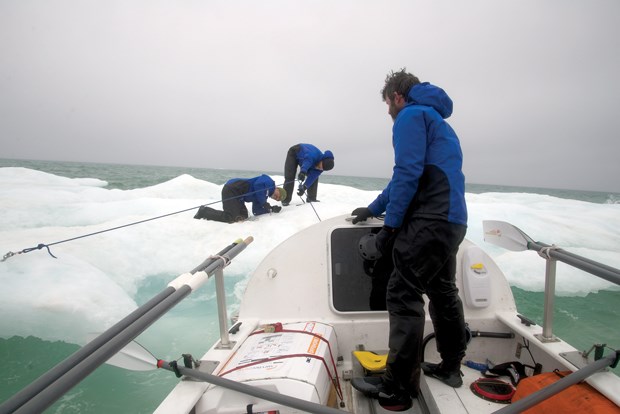If you're still wavering on whether the climate is warming the planet and changing the environment, talk to North Vancouver adventurer Kevin Vallely.
Vallely, along with fellow North Vancouver filmmaker Frank Wolf and crew Paul Gleeson and Denis Barnett, spent weeks in close quarters aboard a custom-built rowboat traversing 1,900 kilometres of the fabled Northwest Passage - a trip previously only possible aboard hulking icebreaker ships.
After making it almost twothirds of the way from Inuvik to Pond Inlet, the expedition dubbed Mainstream Last First came to an end before Labour Day weekend when rough weather put the crew a risk.
"The original intent was to travel 3,000 km to Pond Inlet and boy, I'm amazed we made it 1,900 to be honest. It was really, really challenging conditions with high winds and really erratic weather," Vallely said.
Had they made it, it would have been the first time humans did the trip entirely under their own power in a single season.
The goal of the voyage, which was financed by Mainstream Renewable Power, was to draw the world's attention to the reality of open waters where there used to be ice. Critics and climate change deniers who followed their journey online posted dispiriting comments and twisted it as a win for their ideology.
But, while treacherous conditions meant they could not complete the full length of the trip, Vallely said the message is no less valid.
"You can't point to anomalies. You have to point to hard, cold facts over a period of time, and the reality is the Arctic is changing profoundly and even this year, on a bad year, they'll have far less ice than they did 30 years ago," he said.
It's the elders in the north that have the clearest perspective of how radical the change has been. Species of animals they used to subside on have moved on and Inuit villages have had to adapt and learn to hunt new species coming farther north.
"You get this back and forth debate but if you speak to the people up there, there's no debate. It's happening. It's happening quick," he said With blisters, bruises and exhaustion, the rowers' physical experience was harrowing, Vallely said.
"It's demanding, of course. You're rowing 24 hours a day, taking breaks. You're sleep deprived. Your hands are sore. Your butt is sore. You're not eating the food you want to," Vallely said.
But Mainstream Last First wasn't as "ferocious" physically as some other feats the adventurer has achieved, like sprinting to the South Pole or hiking across a frozen Siberian lake. Where this most recent expedition set itself apart from others for the 48-year-old Vallely was the mental and emotional strain it brought.
"What this had and had a lot more of was real uncertainty and frankly in some ways, danger. The level of anxiety and uncertainty related to big water - ocean, ice water - and not being fully in control," he said. "You're in an environment that's incredibly hostile and incredibly unforgiving with very little chance of rescue if things go wrong - and things change on a dime there."
There were, however, moments of serene beauty.
"Those moments when the sea subsides and it's absolutely gorgeous and warm and you're sitting on the boat and rowing in this magic land of perfection, of mirror glass water and it doesn't feel like the Arctic at all," he said.
Vallely and his crew, fresh from their first shaves and rests in normal beds, are now focused on sharing their story by making a documentary and giving public presentations, including one scheduled for North Vancouver's Centennial Theater in November.
"We want to share with the community and say, 'Hey, this is what's really happening up there.' Sure, we got stymied for various reasons, but it doesn't change the fact we were there seeing it first-hand and speaking to people first-hand and hearing what they have to say."



